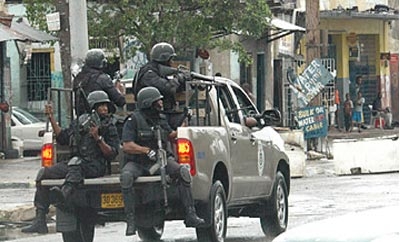Warring gangs behind two years of heightened violence in Jamaica’s capital, Kingston, are reportedly engaging in peace talks, in the latest example of criminals from the region taking to the negotiation table.
Members of eight gangs in West Kingston, along with community representatives, held the first of a planned series of meetings to discuss an end to gang feuding, reported the Jamaica Gleaner.
Local MP Desmond McKenzie told the Gleaner the gangs had contacted him before the meeting to inform him of their plans to lay down their arms because, “They are tired of what is taking place and they want to put an end to it.”
McKenzie, who last year received death threats for his outspoken criticism of the gangs and violence, said he was willing to participate in the process but warned he would not support immunity for any past crimes.
According to McKenzie, more than 100 people have died in West Kingston gang violence over the last two years, which he characterized as the worst period of violence seen in over 20 years.
InSight Crime Analysis
There have been several high profile examples of gang truces in Latin America in recent years, ranging from the government brokered truce between El Salvador’s “maras” to the criminal pact agreed between mafia organizations in Medellin, Colombia.
SEE ALSO: El Salvador Gang Truce: Positives and Negatives
In Jamaica, the talks seem to have been instigated by the gangs themselves, but include the communities where they operate and local politicians. This is a positive sign as it suggests the gangs are engaging with civil society and may be serious in their claims to be weary of violence, as opposed to just looking to gain a criminal advantage.
However, in past and present gang truces elsewhere, the difficulties have not come with striking an agreement and reducing violence in the short term, but backing this with long term sustainable solutions that address the root causes of gang violence.
If a negotiated truce in Kingston succeeds, unless it is followed up with moves to bring in targeted social investments then any truce is likely to provide little more than temporary respite for the city’s residents.
Politicians could have a major role in this, as for decades they have maintained close relationships with gangs, offering patronage in return for votes. While this relationship has generally been damaging for Jamaican politics and society, it could under these circumstances become useful.

